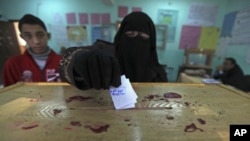Egypt's two main Islamist parties have won about two-thirds of the vote in the second round of parliamentary elections.
Election commission chief Abdel-Moez Ibrahim announced results from the second round of three rounds, which was held December 14 and December 15, followed by a run-off this week. The second round took place in nine provinces, and Ibrahim said turnout reached 65 percent.
The Muslim Brotherhood's Freedom and Justice Party won 36.3 percent of the vote, while the ultra-conservative Salafi al-Nour Party took 28.8 percent.
The vote, staged over six weeks, is the first free election Egypt has held after the 30-year rule of President Hosni Mubarak, who routinely rigged polls before he was overthrown by a popular uprising in February.
A third round of elections covering the remaining nine provinces will take place in early January.
Elections for parliament's less powerful upper house will begin in late January and finish in March, after which the assembly will write a new constitution
Some in the West are alarmed by the front-running status of Islamist parties. But some Islamists are raising alarms of their own, warning of Western-style freedoms, such as gay marriage, to bring voters to their side in the rural areas.
Egyptians working in the tourism industry worry that conservatives in the next parliament may have a negative impact on their business. For tourists this could mean a ban on alcohol and wearing bikinis on the beaches. A spokesman for the Salafi Nour party recently suggested that pharaonic monuments like the Sphinx are idolatrous and should be covered up.
Salafis say they do not want to hurt tourism, though, just make it "sin-free." They have put forth several suggestions, including gender-segregated beaches, and allowing tourists to drink alcohol only in their hotel rooms.
Some information for this report was provided by AP, AFP and Reuters.
| Join the conversation on our social journalism site - Middle East Voices. Follow our Middle East reports on Twitter and discuss them on our Facebook page. |




